Article 74: Sheik Abd-al-Kadir “Coffee guides those who seek wisdom
Overcoming all barriers, coffee has become the irreplaceable energy of creative people, who aspire to progressive society and constantly push themselves beyond their limits to contribute more to life.
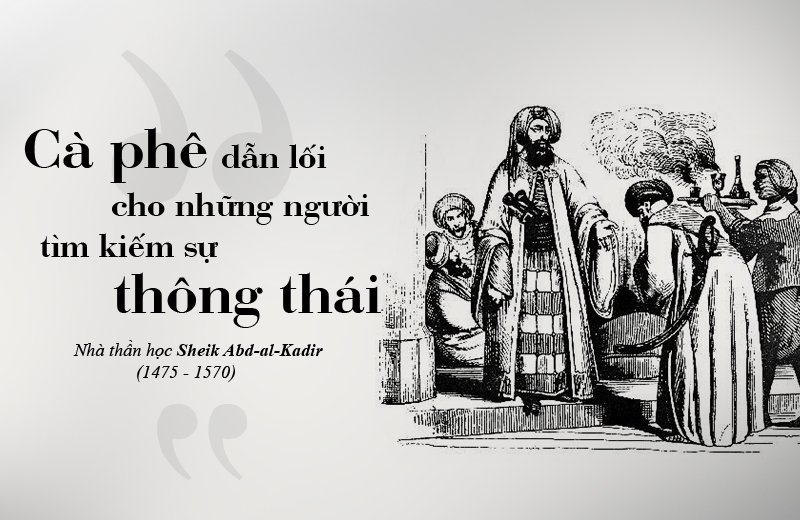
“Coffee guides those who seek wisdom” – Sheik Abd-al-Kadir
The new social space
In the 15th century, coffee followed the Muslim monks to Mecca and Medina, and from there spread to the kingdoms of Persia, Egypt, Syria, and beyond. At that time, Muslims often drank coffee in cathedrals and monasteries. Coffee was so valued that it was never missed out when performing religious ceremonies in public, there was rarely even a dhikr or mawlid (celebrations of the Prophet Muhammad’s birth) without drinking coffee.
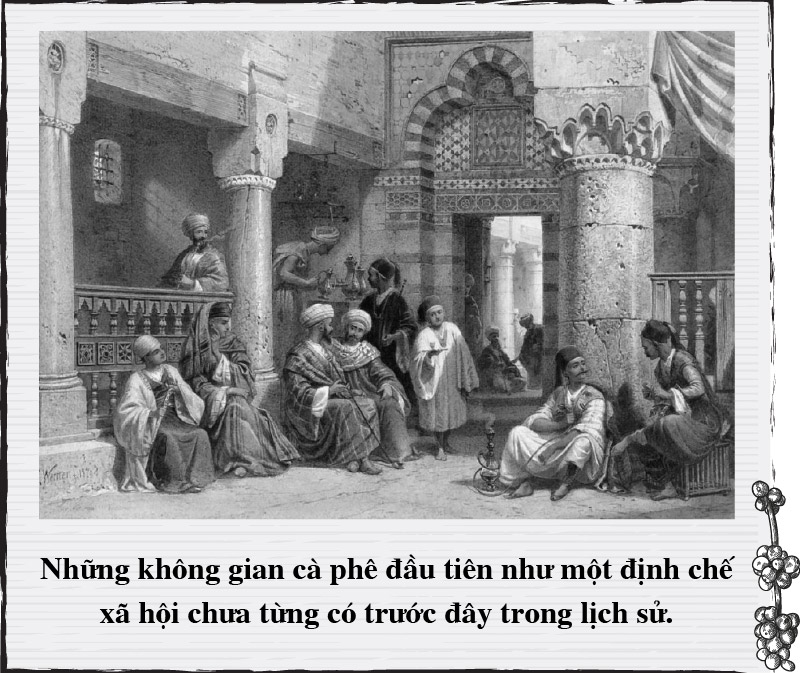
The first coffee spaces as a social institution were unprecedented in history.
Over time, coffee gradually entered the secular life and anyone can enjoy it openly in the mosque’s corridors, especially centered around al-Azhar (a complex of mosques and schools). Coffee gathering places became the center of intellectual life, residents of all walks of life and professions could sit together, enjoy the great taste of coffee and chat and discuss news of the day. They could also entertain themselves by singing, dancing and reciting poetry, as opposed to the conventional monastic behavior.
However, the rapid popularity of coffee in social life caused great controversy, citing religion, law, and lifestyle ethics. For, if coffee had been just a drink for religious practice or for traders on trade routes, it would not have affected the current institutional orders. But when coffee gathered daily people who aspired to pursue knowledge and gradually formed a new kind of public space, which was not under the control of the authorities, it was no longer a simple matter.
In the coffee corridors, elites encouraged the poor to engage in artistic and academic activities that were characteristic of the upper classes. Freedom of thought was becoming more and more public and people bravely voiced their opinions. In the eyes of the authorities, the gathering of people and the emerging radical views would be the seeds of treason, potentially re-establishing the social order in a way that was detrimental to their status.
Some ulema (pious Muslim scholars) also do not accept the use of coffee among the population, which popularized coffee, losing its sanctity in religious rituals. At the same time, coffee attracted more populace than mosques, meaning discussions and entertainment were conducted outside the supervision of religious leaders. The ulema relied on religious beliefs and hindered coffee drinking.
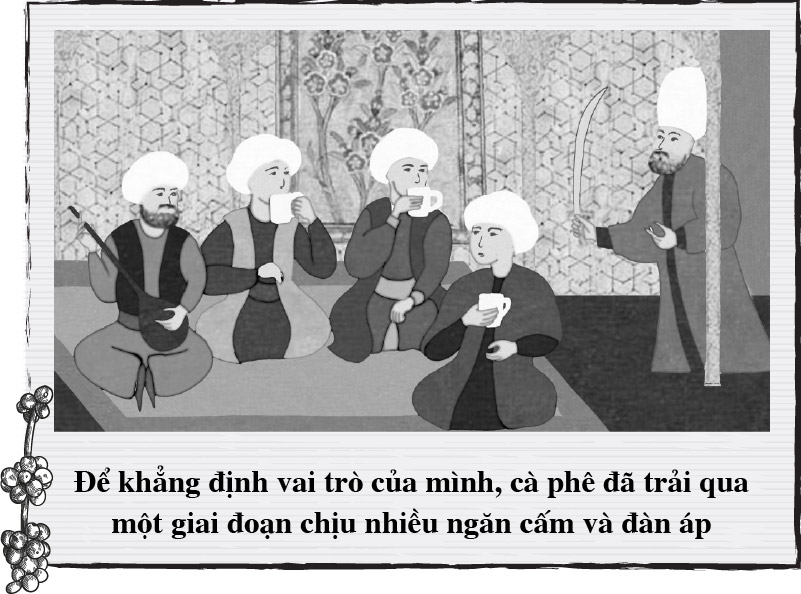
To assert its role, coffee has gone through a period of many prohibitions and repressions
In 1511, Kha’ir Beg al-Mi’mar, the governor of Mecca, ordered all coffee shops to be closed and suppressed those who drank or sold coffee. Then, in 1535 in Cairo, coffee traders were attacked by conservatives who did not recognize the legitimacy of coffee. The most cruel and draconian was the tyrant Murad IV, he hunted down coffee drinkers and executed them on the spot to ensure the destruction of the seeds of opposition. Despite this, Murad IV always used coffee in his palace.
Theologian Sheik Abd-al-Kadir and his contributions affirming the role of coffee
Subject to many prohibitions and repressions, coffee had to undergo a long process to assert its position in society. The beginning was the continuous rise of ideas and theories that celebrated the meaning and function of coffee. In 1587, the theologian Sheik Abd-al-Kadir published “Argument in Favor of the Legitimate Use of Coffee” (Umdat al safwa fi fill al-qahwa). This is considered the first study on coffee comprehensively from the origin, nature, characteristics to the history of coffee development. Although it was primeval, the work became a convincing theoretical basis, helping to clear the doubts of conservative Muslims who had not yet accepted the values that coffee could offer.
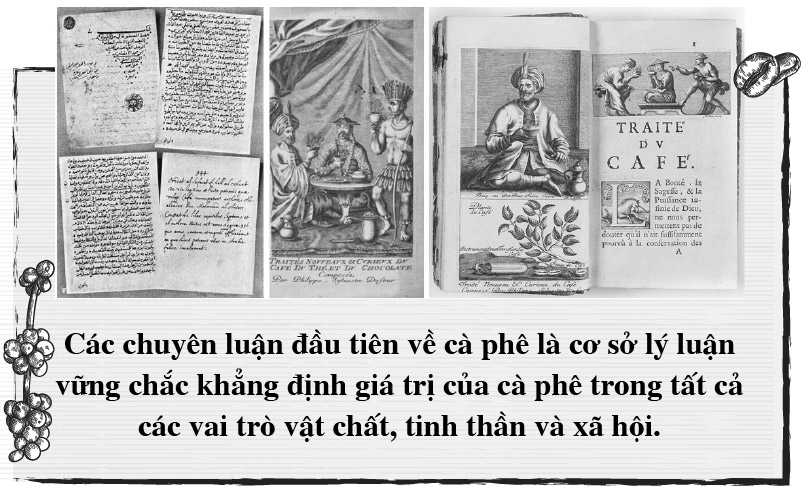
The first technical essays on coffee were a solid theoretical foundation that affirmed the value of coffee in all its physical, spiritual, and social roles
In a chapter on the historical polemic at Mecca in 1511, Sheik Abd-al-Kadir defended the value of coffee and concluded with a collection of verses composed by the best scholars of his time. The most typical were the two poems both titled “In praise of coffee” by Sheik Abd-al-Kadir himself. He emphasized, where coffee appeared people lived with purpose, became noble, true and strived for more wisdom. In a poem called “Coffee Companionship”, he exhorted the people to “Drink coffee with confidence, and pay no attention to the words of the fool who condemns it without any reason”.
The argument in favor of the legitimate use of coffee became a well-known historical document, now kept in the National Library of France. The work brought Sheik Abd-al-Kadir to become one of the pioneering scholars for essays and journals on coffee. After him, many other scholars and scientists published studies on the benefits of coffee. In 1671, the German doctor – Johannes Faust published an essay on the use of coffee in medicine. In the same year, philosopher Philippe Sylvestre Dufour wrote the first book “How to Make Coffee, Tea and Chocolate” in French. In 1686, John Ray, an English biologist praised the qualities of coffee in his work “Universal Botany of Plants”. Philosopher Francis Bacon wrote about coffee in his work “Historia Vitae et Mortis” …
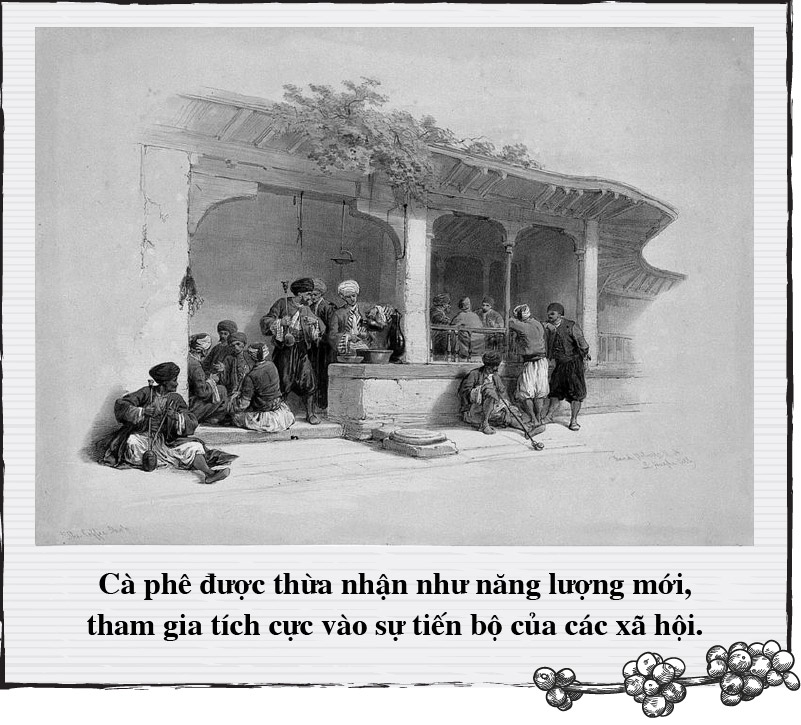
Coffee has been recognized as a new energy, actively participating in the progress of societies.
In addition, there were many botanists, philosophers, scientists across Europe who have studied coffee in depth, such as Leonhard Rauwolf, Adam Olearius, Prospero Alpini, Antony Sherley, George Sandys, Thomas Herbert… who have contributed to untying thinking to see more clearly the nature of what coffee could offer. Since then, coffee has been recognized as a new energy, actively participating in the progress of societies. Coffee shops have also become a necessary space to bring people from different societies, cultures and economies closer together.
View more: https://bit.ly/caphetrietdao
THE REAL COFFEE
ROASTED ONLY FOR PEOPLE OF WISDOM!
Source: “The Philosophical Way of Coffee” – copyright by Trung Nguyen Legend


